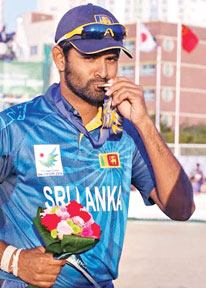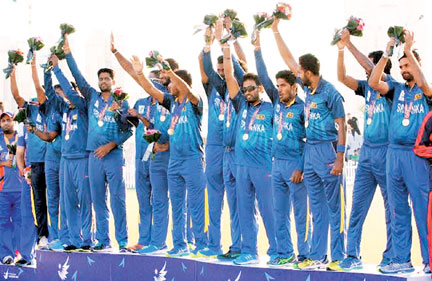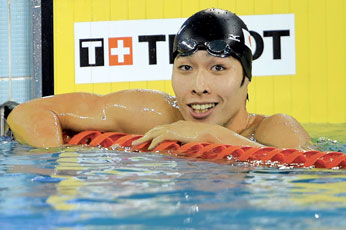|
17th Asian Games in Incheon - Review:
Alarm bells ring for the future
China underlines its sporting supremacy once more :
By Dinesh Weerawansa
Sri Lanka’s pathetic performance at the recently concluded 17th Asian
Games in Incheon, South Korea sent alarm bells for the future of Sri
Lanka sport.
If not for the two medals won by cricketers - the gold in men’s T20
and the bronze in women’s T20 tournaments, the 111-member Sri Lanka
contingent, which competed in eight disciplines, would have returned
home empty handed.
|

Sri Lanka captain Lahiru Thirimanne kisses his Asian Games
gold medal |
True that Sri Lanka won an Asian Games gold medal after 12 years
since sprinters Susanthika Jayasinghe (women’s 100m) and Damayanthi
Darsha (w0men’s 400m) won their respective events in Busan 2002 Games,
when Sri Lanka’s men’s team won the gold medal in T20 cricket
tournament.
But that is nothing to craw about, considering the weak opponents
they faced during the tournament. They were lucky to make it to the
final against minnows Afghanistan, which is virtually an unheard force
in world cricket, on a toss of a coin after their semi-final against the
defending champions Bangladesh was washed off by rain.
The bronze medal won by the women’s team in T20 cricket too was not a
surprise at all, considering the fact that they were beaten by
Bangladesh in the semi-finals. Hence, the two medals won in cricket
could not pay for the sins of remaining competitors who competed in
seven other sports.
Athletes, biggest disappointment
The biggest disappointment was in athletics. Sprinter Chandrika
Subhashini, Nadeeka Lakmali and high jumper Manjula Kumara Wijesekera of
whom much was expected, painted a poor picture.
Though Manjula Kumara has been offered scholarships to sharpen his
skills in the big league, he has failed to better his 2.27m mark set at
the 2004 national championships that gave him the passage to the Athens
Olympics. Exactly ten years later, he could not even better 2.15m in
Inchon.
Though the Sports Ministry had spent over Rs. six million to offer
training facilities to Lakmali and her coach in Finland, the Lankan
javelin thrower cut a sorry figure at the Asian Games. Both Lakmali and
Subashini would have won at least a bronze medal each.
Sri Lanka had been an invincible force in sprints at the Asian Games
up to 2002, it has now turned out to be a struggle to win at least one
bronze medal. But that too was far from Lanka’s reach.
Commonwealth Games gold medalist Chinthana Vidanage, the overall
captain of the Sri Lanka contingent, could come nowhere near his
brilliant lifts. Even the Lankan boxers, for whom their foster father
Dian Gomes has done so much, failed to turn those investments into
results. It was a pity that the boxers had let down that devoted
promoter of the game this time too.
Sri Lanka’s men’s hockey team failed to justify its presence in
Incheon 2014 Games finishing a poor 10th, losing all their five matches
– four in the qualifiers as well as the ninth place play-off to
Singapore 3-5.
Earlier in the group qualifying round of the men’s hockey tournament,
Sri Lanka lost all their matches in humiliating margins - Pakistan
(0-14), India (0-8), China (0-6) and Oman (1-3). Sri Lanka which had
scored only a solitary goal in the qualifying round, that too in the
last game, while conceding a record 31 goals, managed to score three
goals in the last game.
Shemal, a role model
Chef de Mission of the Sri Lanka contingent Rear Admiral Shemal
Fernando played an exemplary role. He was a role model for sports
officials and was an inspiration to all competitors. Despite a busy
schedule and other administration matters that he had to attend, the
senior Navy official was seen at each and every venue where the Lankans
were seen in action.
Sri Lanka need to make a careful stock of what had gone wrong and
find a successful strategy to bounce back at the next Asian Games, at
least to win a couple of gold medals to regain the lost glory. There is
no point in trying to accuse each other but all those who are involved
in the administration of sport must be united to draw up a comprehensive
plan to resurrect our sport.
Asian sports heavyweight China once again underlined its supremacy to
take a commanding lead in the final medals standings with a total of 342
medals that included 151 gold medals, 108 silver and 83 bronze. China
has topped every Asian Games medal table since 1982.
China won more gold medals than the next two countries in the
standings, South Korea and Japan, combined. But that was nowhere near
the record gold haul of 199 medals won as the hosts of the last 2010
Guangzhou Asian Games.
In finishing on top of the 2010 Asian Games medals standings, China
had a record 199 gold, 119 silver and 98 bronze medals to total a
staggering 416 medals – their best event in the history of the Games
since its inauguration in 1951.
|

Men's T20 team came to Sri Lanka contingent's rescue to win
the country's first Asian Games gold medal in 12 years. Pix:
Prince Gunasekera |
China fell 48 gold medals short of their performance at the last 2010
Games. But that too is understandable, as China were flexing its muscles
after the 2008 Beijing Olympic triumph and under favourable home
conditions in Guangzhou. With second-placed South Korea winning only
three more gold medals than their efforts in Guangzhou four years ago
and Japan winning one gold less than 2010, it seems that the 48 gold
medals which China lost have been shared by several other second string
countries.
True that South Korea fared well to secure the second place in the
overall medals standings for fifth successive Games. Yet, it was South
Korea’s worst performance as the hosts. Of the three time South Korea
has hosted Asian Games, the 2014 performance of 79 gold medals was their
worst, after 93 gold medals at 1986 Asian Games in Seoul and a record 96
gold medals at the 2002 Asian Games in Busan.
Japan virtually maintained the same level of performance to remain in
the same place – third, with 47 gold medals, one short that their
performance in Guangzhou 2010. South Korea earned 79 gold medals in
Incheon 2014, three more than it captured at the 2010 Guangzhou Asian
Games but still ending in a distant second place behind China.
Hosts accomplish its objective
South Korea accomplished its objective of finishing second in the
medals for the fifth consecutive Asiad but came up short of its target
of 90 gold medals. The host country still won gold medals in popular
professional sports such as baseball, men's football and men's
basketball. Son Yeon-jae, the star rhythmic gymnast and one of the faces
of the Asian Games here, made history by winning South Korea's first
Asian Games gold in the individual all-around final.
Competitors in the country's traditional gold mines excelled: eight
gold medals from shooting, six from taekwondo and five apiece from
archery and judo. Early in the competition, fencing led South Korea's
quick start with eight gold medals. South Korea won at least a medal in
every discipline in fencing.
Victories in major ball sports also packed arenas. South Korea
defended its baseball gold medal by rallying in the eighth inning
against Chinese Taipei. In an eagerly anticipated gold medal match
against North Korea, South Korea scored in the dying moments for a
nail-biting 1-0 victory.
In men's basketball, South Korea came from a 75-70 deficit against
Iran with two minutes to play to win 79-77, for its first gold since
2002. The women's basketball, handball and volleyball teams were also
golden at the Asian Games, each ending long title droughts.
In artistic gymnastics, Yang Hak-seon took silver in the men's vault
-- the very event in which he's won an Olympic gold and two consecutive
world championships -- while battling a nagging leg injury.
Jin Jong-oh, a pistol shooter with three Olympic gold medals, won a
team gold medal in the men's 10-meter air pistol event but failed to
grab his first individual Asian Games gold. Jin complained of fatigue,
after having to compete at the Asian Games right after returning from
the world championships in Spain.
China excelled across the board, leading all countries in athletics
with 15 gold medals and in swimming with 22 gold medals. It also
captured half of the 14 gold medals at stake in artistic gymnastics, and
six of seven available in table tennis.
Japan ended with 47 gold medals here, compared to the 48 it won at
the previous Asiad in Guangzhou.
Despite accomplishing its initial goal of clinching second place in
the medal standings at the Incheon 2014 Asian Games, South Korea ended
aquatics and athletics events on home soil in a dismal note without a
single gold medal.
With a total of 100 gold medals up for grabs in swimming, diving,
synchronized swimming, water polo, and track and field events, the host
country's biggest-ever delegation of 831 athletes failed to grab a
single gold medal, marking its first such drought since the 1978 Bangkok
Asian Games.
Not a single South Korean topped the victory podium at the Incheon
Asiad Main Stadium, the main venue for track and field events. The host
country - which had initially set a goal of snatching three gold, five
silver and 10 bronze from 47 events, picked up only four silver and six
bronze, again falling well short of its expectations.
Adopted African-born athletes dominate
|

Swimmer Kosuke Hagino of Japan was adjudged The Most
Valuable Player at the Incheon 2014 Asian Games.
|
The track and field events in Incheon were dominated by African-born
athletes running for wealthy Gulf states, mainly Bahrain and Qatar. Femi
Ogunode, who was born a Nigerian but became a naturalized Qatari,
grabbed the gold in the 100m sprint after setting a new continental
record of 9.93 seconds, while Bahrain's African imports secured a hat
trick of long distance gold medals.
China, traditionally considered the powerhouse, barely saved face
after picking up a total of 15 gold medals, with the men's 4x100m relay
team breaking the Asian record. The four Chinese sprinters crossed the
line in 37.99 seconds, becoming the first Asians to go below 38 seconds.
It was also the third best time in the world this year.
However, there were some memorable moments for South Korea,
traditionally considered the underdog in the events.
In a surprise, South Korean men's 4x400m relay team picked up the
silver medal after setting a new national record of 3:04.03. Yeo Ho-sua
anchored the team that also included Park Bong-go, Seong Hyeok-je and
Park Se-jung. Lim Eun-ji, often compared by local fans to world
record-holder Russian Yelena Isinbayeva, picked up the bronze in the
women's pole vault, bagging the first Asian Games medal for South Korea
in the event. Lim vaulted 4.15 meters.
South Korea's national anthem was not played in medal ceremonies at
Munhak Park Tae-hwan Aquatics Center, an arena named after the country's
superstar Park Tae-hwan and the venue for most aquatic events. The hosts
picked up only two silver medals and six bronze medals in swimming. Of
the eight, Park got one silver and five bronze.
Park, a 25-year-old local icon who carried the expectations of a
nation on his shoulders, battled nerves throughout six days of
competition.
In earlier races, Park came in having won the past two Asian Games
gold medals in both the 200m and the 400m freestyle but failed to make
it three in a row in either of them, settling for bronze in both races.
Park tried to end his Asian Games, which could possibly be his last
Asian Games on a high note but finished fourth in the 1,500m freestyle,
well behind the champion and his classic rival, Sun Yang of China.
Park, dubbed ‘Marine Boy’, still managed to make history in the
arena. With the bronze in his final race, the 4x100m medley relay, Park
became the most decorated South Korean athlete in Asian Games history
with 20 medals.
China bagged the greatest number of gold medals with 22 in swimming
competitions. However, Japan managed to snatch more ‘meaningful’ golds
with world-class results.
Japanese sensation Kosuke Hagino, who has cemented his status as the
continent's best all-round swimmer, finished with seven medals,
including four gold medals.
Hagino grabbed gold medals in the men's 200m individual medley, 200m
freestyle, 4x200m freestyle relay and 400m individual medley. He also
bagged one silver and two more bronzes after breaking two Asian records.
The 20-year-old Japanese star has already been tipped as a strong
contender to win medley gold at the 2016 Olympics in Rio de Janeiro.
14 world records shattered
The 17th Asian Games saw 14 world records shattered by its
participating athletes in the western port city of Incheon. More than
half of the new world records were set by weightlifters, who erased nine
of the previous figures set in the sport.
North Korean star weightlifter Kim Un-guk hoisted more than twice his
own weight by lifting up 154kg in the snatch in the men's 62kg class,
and proceeded to break another world record later when his combined
weights in the snatch and the clean and jerk shot up to 332kg.
Two more world records were also logged by other weightlifting champs
from the reclusive country, while the remaining five were all set by
female lifters, including China's Zhou Lulu and Chinese Taipei's Lin Tzu
Chi.
Four world records were rewritten in the shooting disciplines, with
teams from China scoring the highest-ever points in the men's 50-meter
rifle prone, women's 10m air rifle and in the women's team double trap.
South Korean shooter Kim Mi-jin scored 110 points in the women's
individual double trap to be named the world's best shooter in the
discipline.
Archers also flaunted record-breaking performances during the 16-day
competition.
The trio of Seok Ji-hyun, Choi Bo-min and Kim Yun-hee from the host
country, long known for its dominance in the sport, earned a combined
238 points in the compound women's team event and emerged as the new
world record holders.
By country, North Korea and China took the lead after their athletes
rewrote four world records each. They were followed by Chinese Taipei
with three, and then by South Korea and Kazakhstan with two and one,
respectively. Athletes set new Asian records during their athletic
bouts, and even excluding those in the world record category, the number
came to 14 in total.
Kosuke Hagino of Japan, the surprising swimming champ, seized first
place in the men's 200m individual medley with an Asian record of
1:55.34. Hagino, voted the Most Valuable Player of the Asian Games,
stunned a pair of Olympic champs, Sun Yang of China and Park Tae-hwan of
South Korea, to win the 200m freestyle race, one of four swimming gold
medals here. Qatar's Femi Seun Ogunode grabbed the gold in the men's
100m sprint in an Asian record of 9.93 seconds, becoming the fastest man
on the continent.
The Nigeria-born sprinter, who moved to Qatar to represent the west
Asian country in 2009, got inside the 10-second barrier, which many
runners originally from Asia have been struggling to break for years.
Spectators present at this year's Asian Games may have been among the
lucky ones as the 2010 Asian Games produced only three world records
fall, while nine world records were set at the 2006 event. The Busan
Asian Games, another event hosted by South Korea in 2002, currently
holds the mark for the highest number of world records set at an Asian
Games - 22.
All in all, there were a total of 14 world records and 28 Asian
records at this year's Asian Games in Incheon. The numerous records at
the Asian Games attest to the notion that the level of competition is in
Asia is not that behind compared with that of the whole world.
It was a rare honour for the writer who covered his sixth successive
Asian Games for the Sunday Observer and the Daily News, having reported
the Asian version of the Olympics in Hiroshima 1994, Bangkok 1998, Busan
2002, Doha 2006 and Guangzhou 2010.
The Incheon 2014 was even better experience with six old Royalists
playing their respective roles for ‘Team Sri Lanka’. Beside my
classmates - Amateur Boxing Association of Sri Lanka President Aubrey
Peiris and Amateur Rowing Association of Sri Lanka Secretary Dimuth
Gunawardena, it was nice to have the company of veteran boxing promoter
cum coach Dian Gomes, Chef de Mission Rear Admiral Shemal Fernando and
beach volleyball manager Air Vice Marshal Rohan Pathirage in the ‘Team
Royal’. |

